人教版(2019)必修第一册Unit 3 Sports and Fitness Discovering Useful Structures 课件(共16张PPT)
文档属性
| 名称 | 人教版(2019)必修第一册Unit 3 Sports and Fitness Discovering Useful Structures 课件(共16张PPT) |  | |
| 格式 | pptx | ||
| 文件大小 | 844.1KB | ||
| 资源类型 | 教案 | ||
| 版本资源 | 人教版(2019) | ||
| 科目 | 英语 | ||
| 更新时间 | 2024-04-05 17:34:43 | ||
图片预览

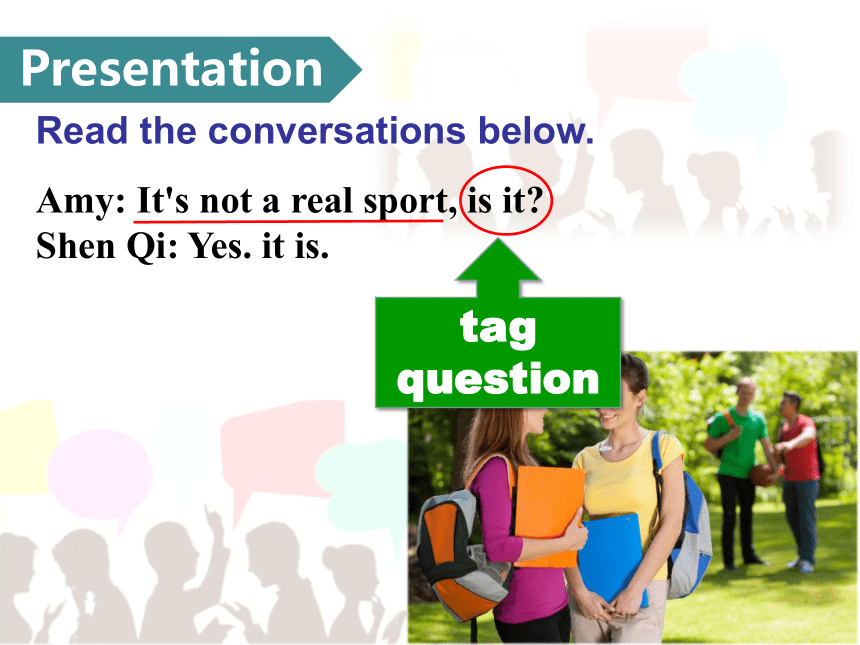
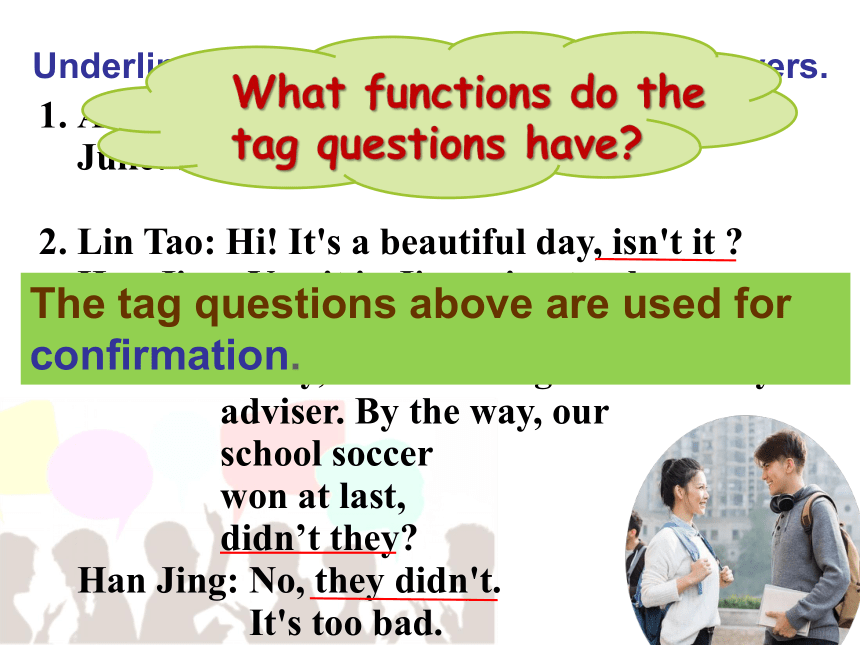
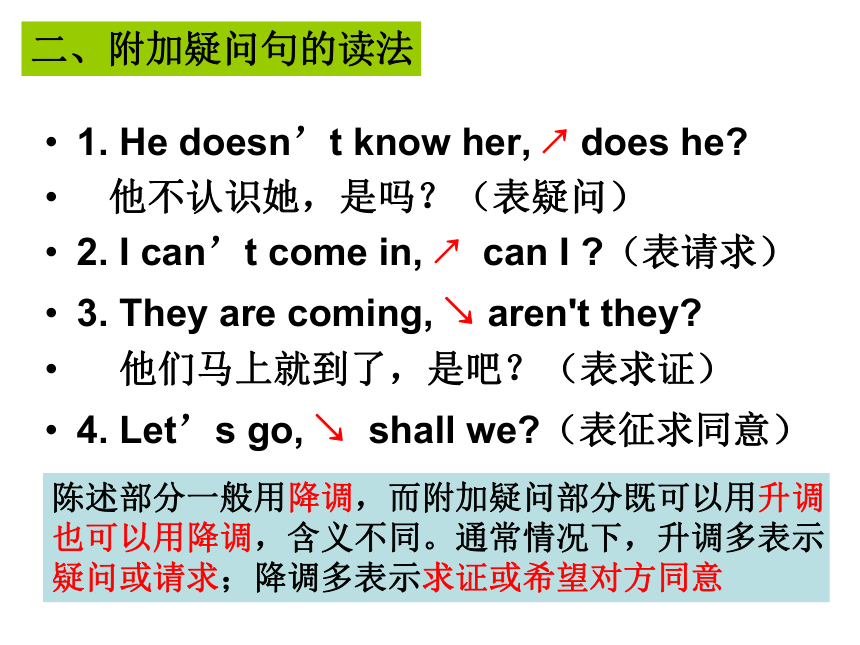
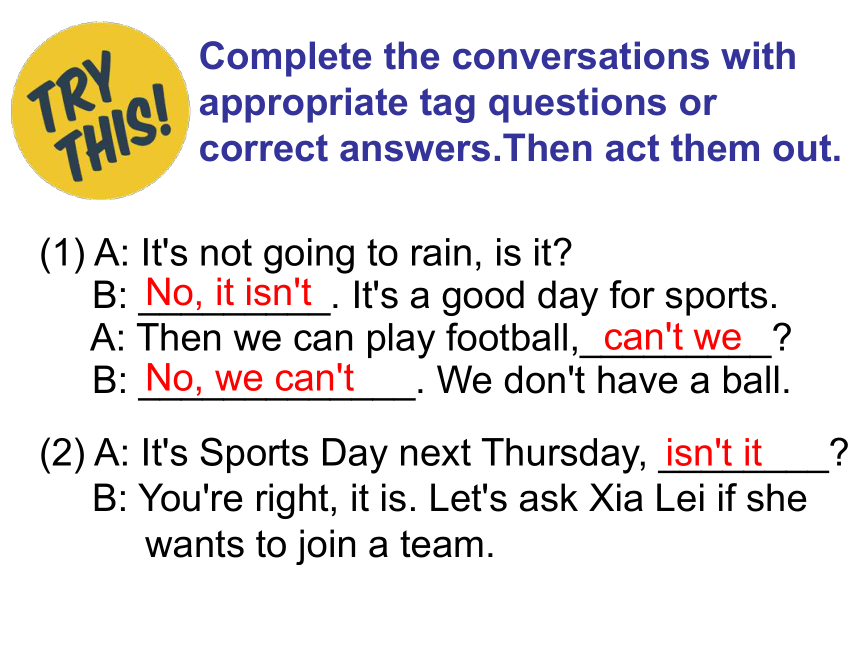
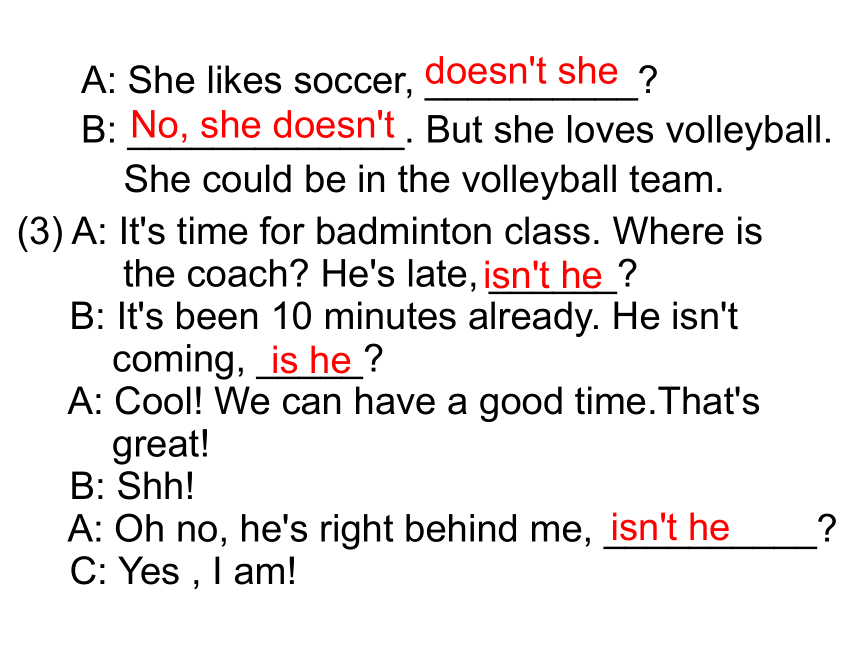
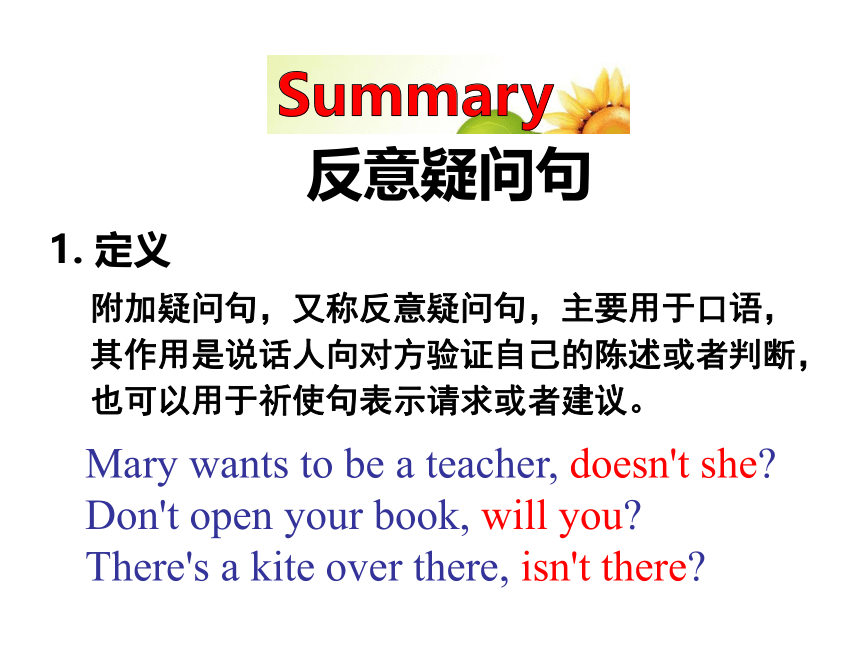
文档简介
(共16张PPT)
Discoving Useful Structures P40
新人教必修Book 1
Unit 3 Sports and Fitness
Amy: It's not a real sport, is it
Shen Qi: Yes. it is.
Read the conversations below.
Presentation
tag question
1. Adam: That sounds interesting, doesn't it
Julie: Sure. it does.
2. Lin Tao: Hi! It's a beautiful day, isn't it
Han Jing: Yes, it is. I'm going to play soccer.
Can you come along and join us
Lin Tao: Sorry, I can’t. I've got to meet my
adviser. By the way, our
school soccer
won at last,
didn’t they
Han Jing: No, they didn't.
It's too bad.
Underline the tag questions and their answers.
What functions do the tag questions have
The tag questions above are used for confirmation.
1. He doesn’t know her, ↗does he
他不认识她,是吗?(表疑问)
2. I can’t come in, ↗ can I (表请求)
3. They are coming, ↘aren't they
他们马上就到了,是吧?(表求证)
4. Let’s go, ↘ shall we (表征求同意)
二、附加疑问句的读法
陈述部分一般用降调,而附加疑问部分既可以用升调
也可以用降调,含义不同。通常情况下,升调多表示
疑问或请求;降调多表示求证或希望对方同意
(1) A: It's not going to rain, is it
B: _________. It's a good day for sports.
A: Then we can play football,_________
B: _____________. We don't have a ball.
Complete the conversations with appropriate tag questions or
correct answers.Then act them out.
No, it isn't
can't we
No, we can't
(2) A: It's Sports Day next Thursday, ________
B: You're right, it is. Let's ask Xia Lei if she
wants to join a team.
isn't it
(3) A: It's time for badminton class. Where is
the coach He's late, ______
B: It's been 10 minutes already. He isn't
coming, _____
A: Cool! We can have a good time.That's
great!
B: Shh!
A: Oh no, he's right behind me, __________
C: Yes , I am!
A: She likes soccer, __________
B: _____________. But she loves volleyball.
She could be in the volleyball team.
doesn't she
No, she doesn't
is he
isn't he
isn't he
Summary
反意疑问句
1. 定义
附加疑问句,又称反意疑问句,主要用于口语,其作用是说话人向对方验证自己的陈述或者判断,也可以用于祈使句表示请求或者建议。
Mary wants to be a teacher, doesn't she
Don't open your book, will you
There's a kite over there, isn't there
2. 基本结构
陈述部分
附加疑问部分
由助动词、be动词或情态动词和表示主语的代词构成。
1.肯定式陈述部分+否定附加疑问部分
3. 分类
You are an actor, aren’t you
He likes soccer, doesn’t he
We have ever been to Shanghai, haven’t we
2.否定式陈述部分+肯定附加疑问部分
It wasn’t fine yesterday, was it
You won’t go to America, will you
3.含有否定词的陈述部分+肯定附加疑问部分
否定意义的词包括:hardly, never, nothing, few, little, no, seldom, too…to等
4. Few people eat wild animals now, _______
3. There is nothing important in the newspaper,
_______
2. She has never been to Hong Kong,______
_____
例:
1. Mr. Smith can hardly speak Chinese, _____
_____
is there
do they
has
she
can
he
4.祈使句+附加疑问部分
①陈述句为“Let’s…”结构时,表示“让我们(你我双
方)”附加问句一般用 “shall we ”
②陈述句为“Let us…” 结构时,表示“你让我们...”,
附加问句一般用 “will you ”
例:
1. Let’s go home, _______
2. Let us go home, ________
shall we
will you
5.情态动词+附加疑问部分
当陈述部分含有情态动词时,疑问部分会重复前面情态动词。
例:
1. He can play the piano, _________
2. We shouldn't go right now, __________
3. They can’t finish it, ________
can't he
should we
can they
6.There be句型
陈述句为There be结构时,附加问句仍用there。
例:
1.There is a famous doctor in your
hometown, _________
Yes, there is.
2.There will not be any classes
tomorrow, __________
No, there won’t.
isn't there
will there
4. 反意疑问句的回答:
回答反意疑问句的问题时,要注意根据事实真实情况回答。
具体来说:
(1)如果事实是肯定的,就用Yes回答,
(2)如果事实是否定的,就用No回答。
例:
You haven’t been to the U. S. , have you?
_______________. I want to have a visit one day.
______________. I have been there three times.
No,I haven't
Yes, I have
一、用恰当的反意疑问句完成句子。
1. She seldom goes to the cinema, __________
2. You won't be away for long,________
3. You've already got our invitation, __________
4. — Your uncle told me that he overslept.
— Oh, my uncle rarely used to oversleep,
_________
5. We never dared to ask him a question, ______
6. The old lady scarcely cares for anything,
_________
did we
does she
will you
haven't you
did he
does she
Practice
二、句子改错。
1. You never told us why you were late for the last meeting. didn't you
2. The doctor soon had the patient walking again, hadn't he
3. Everything seems all right, isn't it
4. There won’t be any concert this Saturday evening, will it
5. Let’s go shopping, will you
6. —They don’t work hard, do they
—Yes, they do. They are very lazy.
did you
didn't he
doesn't it
will there
shall we
No, they don't.
Thank you!
Discoving Useful Structures P40
新人教必修Book 1
Unit 3 Sports and Fitness
Amy: It's not a real sport, is it
Shen Qi: Yes. it is.
Read the conversations below.
Presentation
tag question
1. Adam: That sounds interesting, doesn't it
Julie: Sure. it does.
2. Lin Tao: Hi! It's a beautiful day, isn't it
Han Jing: Yes, it is. I'm going to play soccer.
Can you come along and join us
Lin Tao: Sorry, I can’t. I've got to meet my
adviser. By the way, our
school soccer
won at last,
didn’t they
Han Jing: No, they didn't.
It's too bad.
Underline the tag questions and their answers.
What functions do the tag questions have
The tag questions above are used for confirmation.
1. He doesn’t know her, ↗does he
他不认识她,是吗?(表疑问)
2. I can’t come in, ↗ can I (表请求)
3. They are coming, ↘aren't they
他们马上就到了,是吧?(表求证)
4. Let’s go, ↘ shall we (表征求同意)
二、附加疑问句的读法
陈述部分一般用降调,而附加疑问部分既可以用升调
也可以用降调,含义不同。通常情况下,升调多表示
疑问或请求;降调多表示求证或希望对方同意
(1) A: It's not going to rain, is it
B: _________. It's a good day for sports.
A: Then we can play football,_________
B: _____________. We don't have a ball.
Complete the conversations with appropriate tag questions or
correct answers.Then act them out.
No, it isn't
can't we
No, we can't
(2) A: It's Sports Day next Thursday, ________
B: You're right, it is. Let's ask Xia Lei if she
wants to join a team.
isn't it
(3) A: It's time for badminton class. Where is
the coach He's late, ______
B: It's been 10 minutes already. He isn't
coming, _____
A: Cool! We can have a good time.That's
great!
B: Shh!
A: Oh no, he's right behind me, __________
C: Yes , I am!
A: She likes soccer, __________
B: _____________. But she loves volleyball.
She could be in the volleyball team.
doesn't she
No, she doesn't
is he
isn't he
isn't he
Summary
反意疑问句
1. 定义
附加疑问句,又称反意疑问句,主要用于口语,其作用是说话人向对方验证自己的陈述或者判断,也可以用于祈使句表示请求或者建议。
Mary wants to be a teacher, doesn't she
Don't open your book, will you
There's a kite over there, isn't there
2. 基本结构
陈述部分
附加疑问部分
由助动词、be动词或情态动词和表示主语的代词构成。
1.肯定式陈述部分+否定附加疑问部分
3. 分类
You are an actor, aren’t you
He likes soccer, doesn’t he
We have ever been to Shanghai, haven’t we
2.否定式陈述部分+肯定附加疑问部分
It wasn’t fine yesterday, was it
You won’t go to America, will you
3.含有否定词的陈述部分+肯定附加疑问部分
否定意义的词包括:hardly, never, nothing, few, little, no, seldom, too…to等
4. Few people eat wild animals now, _______
3. There is nothing important in the newspaper,
_______
2. She has never been to Hong Kong,______
_____
例:
1. Mr. Smith can hardly speak Chinese, _____
_____
is there
do they
has
she
can
he
4.祈使句+附加疑问部分
①陈述句为“Let’s…”结构时,表示“让我们(你我双
方)”附加问句一般用 “shall we ”
②陈述句为“Let us…” 结构时,表示“你让我们...”,
附加问句一般用 “will you ”
例:
1. Let’s go home, _______
2. Let us go home, ________
shall we
will you
5.情态动词+附加疑问部分
当陈述部分含有情态动词时,疑问部分会重复前面情态动词。
例:
1. He can play the piano, _________
2. We shouldn't go right now, __________
3. They can’t finish it, ________
can't he
should we
can they
6.There be句型
陈述句为There be结构时,附加问句仍用there。
例:
1.There is a famous doctor in your
hometown, _________
Yes, there is.
2.There will not be any classes
tomorrow, __________
No, there won’t.
isn't there
will there
4. 反意疑问句的回答:
回答反意疑问句的问题时,要注意根据事实真实情况回答。
具体来说:
(1)如果事实是肯定的,就用Yes回答,
(2)如果事实是否定的,就用No回答。
例:
You haven’t been to the U. S. , have you?
_______________. I want to have a visit one day.
______________. I have been there three times.
No,I haven't
Yes, I have
一、用恰当的反意疑问句完成句子。
1. She seldom goes to the cinema, __________
2. You won't be away for long,________
3. You've already got our invitation, __________
4. — Your uncle told me that he overslept.
— Oh, my uncle rarely used to oversleep,
_________
5. We never dared to ask him a question, ______
6. The old lady scarcely cares for anything,
_________
did we
does she
will you
haven't you
did he
does she
Practice
二、句子改错。
1. You never told us why you were late for the last meeting. didn't you
2. The doctor soon had the patient walking again, hadn't he
3. Everything seems all right, isn't it
4. There won’t be any concert this Saturday evening, will it
5. Let’s go shopping, will you
6. —They don’t work hard, do they
—Yes, they do. They are very lazy.
did you
didn't he
doesn't it
will there
shall we
No, they don't.
Thank you!
